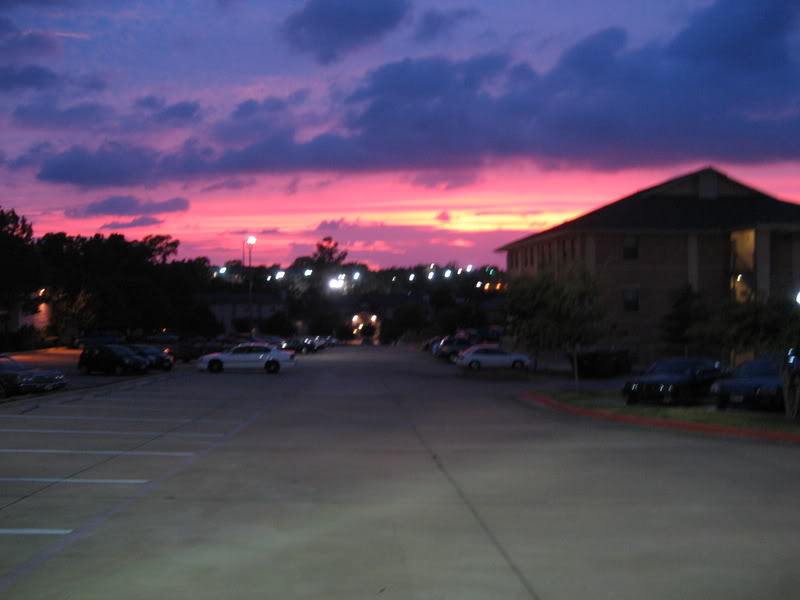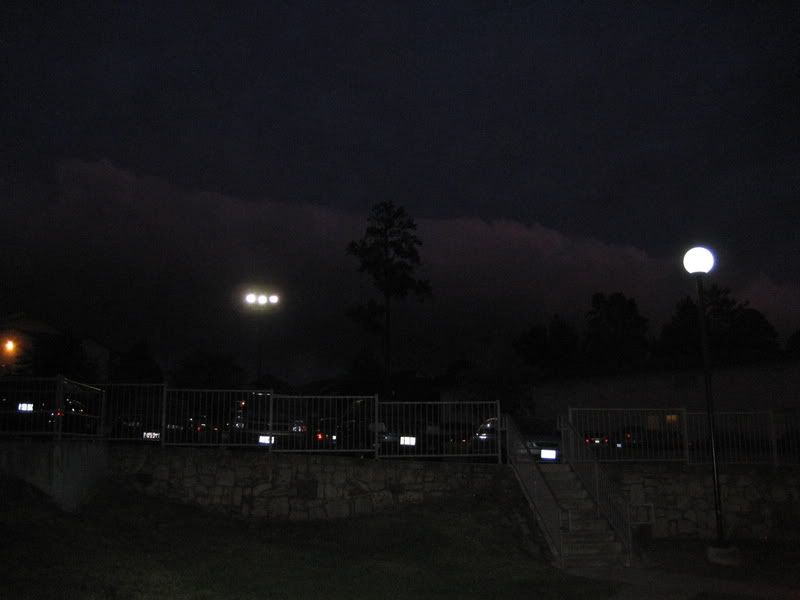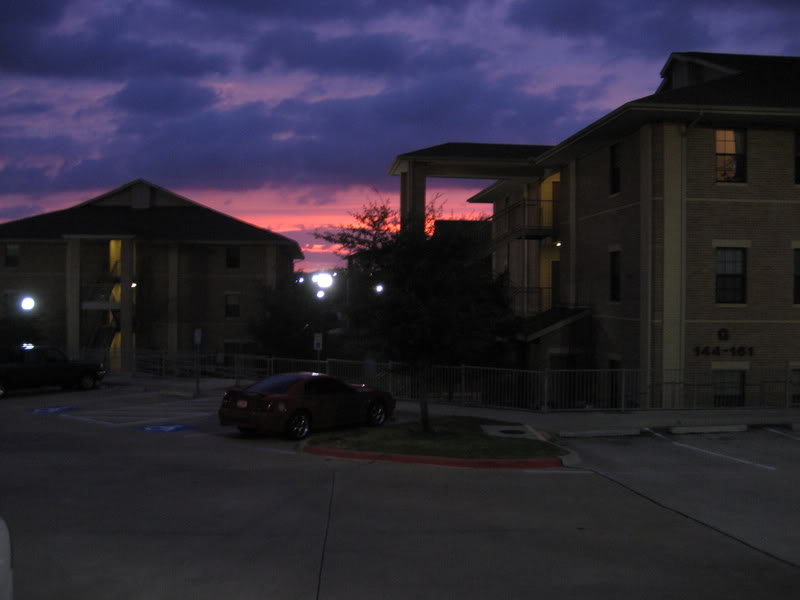Hurricane Ike to texas
#34

#37
Good luck you guys on the gulf coast. We here on the east coast know your anxiety.
But this looks escpecially nasty, if your on the coast get out of there for sure. Inland, it depends on how well it holds its strength. Could be bad for you too.
On the right side of the storm is the most dangerous if it's gonna skirt you because of the small and sometimes larger tornados that will form without warning.
Any lowlying flood zones (even inland) should get to higher ground.
Get some flashlights and batteries, some first aid stuff, A weather radio is a good idea too, I used mine when Hanna came through last weekend, it post's audible alerts for flooding, tornados, etc..
And please do buy all the bread and milk in the store.. . Canned goods are a better bet if you are prone to power outs for long periods..
. Canned goods are a better bet if you are prone to power outs for long periods..
If it were me I would stock up on beer and cigs.
Good Luck everyone, and just remember, it's a natural occurance. Just heed your warnings as they are posted..
But this looks escpecially nasty, if your on the coast get out of there for sure. Inland, it depends on how well it holds its strength. Could be bad for you too.
On the right side of the storm is the most dangerous if it's gonna skirt you because of the small and sometimes larger tornados that will form without warning.
Any lowlying flood zones (even inland) should get to higher ground.
Get some flashlights and batteries, some first aid stuff, A weather radio is a good idea too, I used mine when Hanna came through last weekend, it post's audible alerts for flooding, tornados, etc..
And please do buy all the bread and milk in the store..
 . Canned goods are a better bet if you are prone to power outs for long periods..
. Canned goods are a better bet if you are prone to power outs for long periods.. If it were me I would stock up on beer and cigs.
Good Luck everyone, and just remember, it's a natural occurance. Just heed your warnings as they are posted..

Last edited by rebelyell; 09-10-2008 at 11:24 PM. Reason: spelling
#39
Follow these instructions and youll be fine
FLORIDA HURRICANE PREPARATION
You all should be aware of hurricane preparations, but in case you need
a refresher course: We're about to enter the peak of the hurricane
season. Any minute now, you're going to turn on the TV and see a weather
person pointing to some radar blob out in the Atlantic Ocean and making
two basic meteorological points....
(1) There is no need to panic.
(2) We could all be killed.
Yes, hurricane season is an exciting time to be in Florida. If you're
new to the area, you're probably wondering what you need to do to
prepare for the possibility that we'll get hit by "the big one."
Based on our insurance industry experiences, we recommend that you
follow this simple three-step hurricane preparedness plan:
STEP 1: Buy enough food and bottled water to last your family for at
least three days.
STEP 2: Put these supplies into your car.
STEP 3: Drive to Nebraska and remain there until Halloween.
Unfortunately, statistics show that most people will not follow this
sensible plan. Most people will foolishly stay here in Florida.
We'll start with one of the most important hurricane preparedness items:
HOMEOWNERS' INSURANCE: If you own a home, you must have hurricane
insurance. Fortunately, this insurance is cheap and easy to get, as long as your home meets two basic requirements:
(1) It is reasonably well-built, and It is located in Wisconsin
Unfortunately, if your home is located in Florida, or any other area
that might actually be hit by a hurricane, most insurance companies
would prefer not to sell you hurricane insurance, because then they
might be required to pay YOU money, and that is certainly not why they
got into the insurance business in the first place. So you'll have to
scrounge around for an insurance company, which will charge you an
annual premium roughly equal to the replacement value of your house.
At any moment, this company can drop you like used dental floss.
SHUTTERS:
Your house should have hurricane shutters on all the windows, all the
doors. There are several types of shutters, with advantages and
disadvantages:
Plywood shutters: The advantage is that, because you make them yourself,
they're cheap.
Sheet-metal shutters: The advantage is that these work well, once you
get them all up. The disadvantage is that once you get them all up, your
hands will be useless bleeding stumps, and it will be December.
Roll-down shutters: The advantages are that they're very easy to use,
and will definitely protect your house. The disadvantage is that you
will have to sell your house to pay for them.
Hurricane-proof windows: These are the newest wrinkle in hurricane
protection: They look like ordinary windows, but they can withstand
hurricane winds! You can be sure of this, because the salesman says so.
He lives in Nebraska.
Hurricane Proofing your property: As the hurricane approaches, check
your yard for movable objects like barbecue grills, planters, patio
furniture, visiting relatives, etc... you should, as a precaution, throw
these items into your swimming pool (if you don't have a swimming pool,
you should have one built immediately). Otherwise, the hurricane winds
will turn these objects into deadly missiles.
EVACUATION ROUTE:
If you live in a low-lying area, you should have an evacuation route
planned out.
(To determine whether you live in a low-lying area, look at your
driver's license...if it says "Florida," you live in a low-lying area.)
The purpose of having an evacuation route is to avoid being trapped in
your home when a major storm hits.
Instead, you will be trapped in a gigantic traffic jam several miles
from your home, along with two hundred thousand other evacuees. So, as a
bonus, you will not be lonely.
HURRICANE SUPPLIES:
If you don't evacuate, you will need a mess of supplies. Do not buy them
now! Florida tradition requires that you wait until the last possible
minute, then go to the supermarket and get into vicious fights with
strangers over who gets the last can of cat food.
In addition to food and water, you will need the following supplies:
23 flashlights. At least $167 worth of batteries that turn out to be,
when the power goes off, to be the wrong size for the flashlights.
Bleach. (No, I don't know what the bleach is for. NOBODY knows what the
bleach is for, but it's traditional, so GET some!)
A big knife that you can strap to your leg. (This will be useless in a
hurricane, but it looks cool.
A large quantity of raw chicken, to placate the alligators. (Ask anybody
who went through Andrew; after the hurricane, there WILL be irate
alligators.)
$35,000 in cash or diamonds so that, after the hurricane passes, you can
buy a generator from a man with no discernible teeth.
Of course these are just basic precautions. As the hurricane draws near,
it is vitally important that you keep abreast of the situation by
turning on your television if you have a generator that's working to
keep the TV going and watching TV reporters in rain slickers stand right
next to the ocean and tell you over and over how vitally important it is
for everybody to stay away from the ocean.
Good luck and remember: It's great living in Paradise..............
FLORIDA HURRICANE PREPARATION
You all should be aware of hurricane preparations, but in case you need
a refresher course: We're about to enter the peak of the hurricane
season. Any minute now, you're going to turn on the TV and see a weather
person pointing to some radar blob out in the Atlantic Ocean and making
two basic meteorological points....
(1) There is no need to panic.
(2) We could all be killed.
Yes, hurricane season is an exciting time to be in Florida. If you're
new to the area, you're probably wondering what you need to do to
prepare for the possibility that we'll get hit by "the big one."
Based on our insurance industry experiences, we recommend that you
follow this simple three-step hurricane preparedness plan:
STEP 1: Buy enough food and bottled water to last your family for at
least three days.
STEP 2: Put these supplies into your car.
STEP 3: Drive to Nebraska and remain there until Halloween.
Unfortunately, statistics show that most people will not follow this
sensible plan. Most people will foolishly stay here in Florida.
We'll start with one of the most important hurricane preparedness items:
HOMEOWNERS' INSURANCE: If you own a home, you must have hurricane
insurance. Fortunately, this insurance is cheap and easy to get, as long as your home meets two basic requirements:
(1) It is reasonably well-built, and It is located in Wisconsin
Unfortunately, if your home is located in Florida, or any other area
that might actually be hit by a hurricane, most insurance companies
would prefer not to sell you hurricane insurance, because then they
might be required to pay YOU money, and that is certainly not why they
got into the insurance business in the first place. So you'll have to
scrounge around for an insurance company, which will charge you an
annual premium roughly equal to the replacement value of your house.
At any moment, this company can drop you like used dental floss.
SHUTTERS:
Your house should have hurricane shutters on all the windows, all the
doors. There are several types of shutters, with advantages and
disadvantages:
Plywood shutters: The advantage is that, because you make them yourself,
they're cheap.
Sheet-metal shutters: The advantage is that these work well, once you
get them all up. The disadvantage is that once you get them all up, your
hands will be useless bleeding stumps, and it will be December.
Roll-down shutters: The advantages are that they're very easy to use,
and will definitely protect your house. The disadvantage is that you
will have to sell your house to pay for them.
Hurricane-proof windows: These are the newest wrinkle in hurricane
protection: They look like ordinary windows, but they can withstand
hurricane winds! You can be sure of this, because the salesman says so.
He lives in Nebraska.
Hurricane Proofing your property: As the hurricane approaches, check
your yard for movable objects like barbecue grills, planters, patio
furniture, visiting relatives, etc... you should, as a precaution, throw
these items into your swimming pool (if you don't have a swimming pool,
you should have one built immediately). Otherwise, the hurricane winds
will turn these objects into deadly missiles.
EVACUATION ROUTE:
If you live in a low-lying area, you should have an evacuation route
planned out.
(To determine whether you live in a low-lying area, look at your
driver's license...if it says "Florida," you live in a low-lying area.)
The purpose of having an evacuation route is to avoid being trapped in
your home when a major storm hits.
Instead, you will be trapped in a gigantic traffic jam several miles
from your home, along with two hundred thousand other evacuees. So, as a
bonus, you will not be lonely.
HURRICANE SUPPLIES:
If you don't evacuate, you will need a mess of supplies. Do not buy them
now! Florida tradition requires that you wait until the last possible
minute, then go to the supermarket and get into vicious fights with
strangers over who gets the last can of cat food.
In addition to food and water, you will need the following supplies:
23 flashlights. At least $167 worth of batteries that turn out to be,
when the power goes off, to be the wrong size for the flashlights.
Bleach. (No, I don't know what the bleach is for. NOBODY knows what the
bleach is for, but it's traditional, so GET some!)
A big knife that you can strap to your leg. (This will be useless in a
hurricane, but it looks cool.
A large quantity of raw chicken, to placate the alligators. (Ask anybody
who went through Andrew; after the hurricane, there WILL be irate
alligators.)
$35,000 in cash or diamonds so that, after the hurricane passes, you can
buy a generator from a man with no discernible teeth.
Of course these are just basic precautions. As the hurricane draws near,
it is vitally important that you keep abreast of the situation by
turning on your television if you have a generator that's working to
keep the TV going and watching TV reporters in rain slickers stand right
next to the ocean and tell you over and over how vitally important it is
for everybody to stay away from the ocean.
Good luck and remember: It's great living in Paradise..............
#40

Last edited by PColav6; 09-11-2008 at 04:18 PM.
#44
Disinfecting with household bleach kills some, but not all, types of disease-causing organisms. The bleach must contain chlorine in order to work. Do not use scented bleaches, color-safe bleaches, or bleaches with added cleaners. Most household chlorine bleaches have 4-6% available chlorine, in which case you should add 1/8 teaspoon (8 drops) of regular, unscented, liquid household bleach for each gallon of water (2 drops per Liter), stir it well and let it stand for 30 minutes before you use it. Check the label; if the percentage of available chlorine is around 1%, or you don't know what the percentage is, use 40 drops per gallon or 10 drops per Liter; if the percentage is 7-10%, use 4 drops per gallon or 1 drop per Liter. Double the amount of chlorine if the water is cloudy, murky, or colored, or if the water is extremely cold. If after sitting covered for 30 minutes the water doesn't have a slight chlorine odor, repeat the dosage and let sit for another 15 minutes.[5]
#47
yeah that thing really switched course overnight. At least its not going to be a 4 like they thought the other day. I don't even think we will get much wind/rain over the weekend anymore. Good luck to those of you on the coast and houston. Its good to see quite a few on the coast left there was quite a bit of traffic on I35 today
#58
that looks very similar to my apartment complex on campus minus the dorms plus balconies. I've been chilling out on the patio nice breeze out there I'm sure you have more than a breeze though at the moment haha. I would move the car though 

Last edited by Dave04Mustang; 09-12-2008 at 08:22 PM.







 .
.